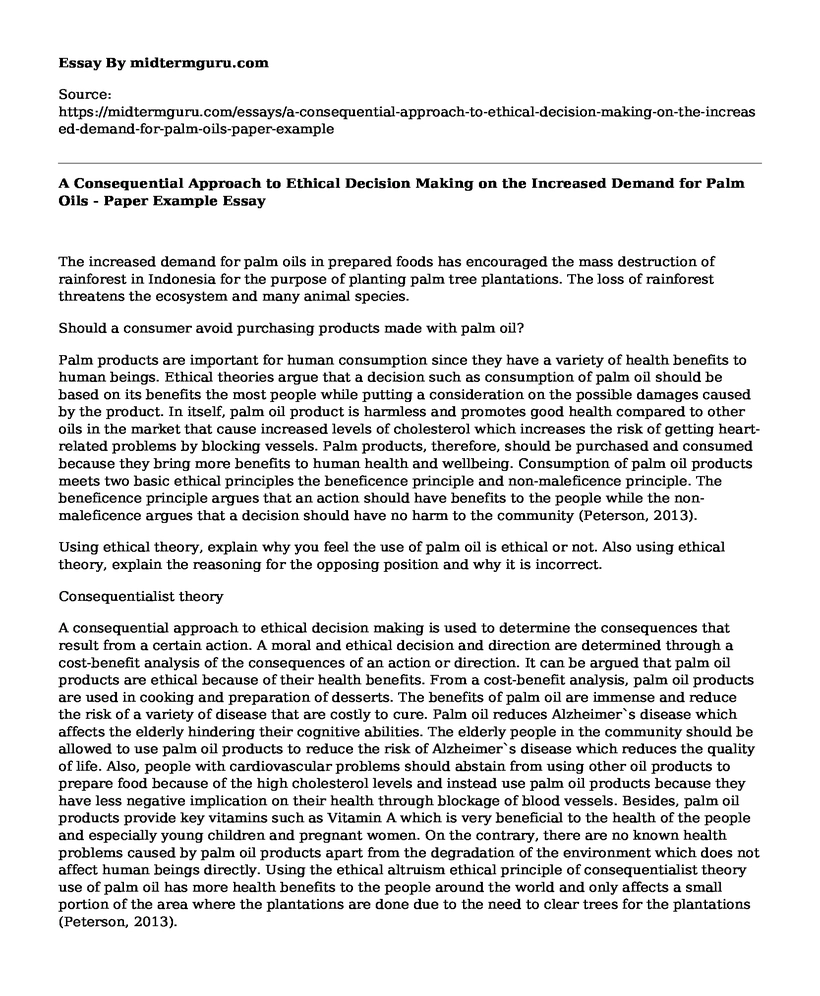The increased demand for palm oils in prepared foods has encouraged the mass destruction of rainforest in Indonesia for the purpose of planting palm tree plantations. The loss of rainforest threatens the ecosystem and many animal species.
Should a consumer avoid purchasing products made with palm oil?
Palm products are important for human consumption since they have a variety of health benefits to human beings. Ethical theories argue that a decision such as consumption of palm oil should be based on its benefits the most people while putting a consideration on the possible damages caused by the product. In itself, palm oil product is harmless and promotes good health compared to other oils in the market that cause increased levels of cholesterol which increases the risk of getting heart-related problems by blocking vessels. Palm products, therefore, should be purchased and consumed because they bring more benefits to human health and wellbeing. Consumption of palm oil products meets two basic ethical principles the beneficence principle and non-maleficence principle. The beneficence principle argues that an action should have benefits to the people while the non-maleficence argues that a decision should have no harm to the community (Peterson, 2013).
Using ethical theory, explain why you feel the use of palm oil is ethical or not. Also using ethical theory, explain the reasoning for the opposing position and why it is incorrect.
Consequentialist theory
A consequential approach to ethical decision making is used to determine the consequences that result from a certain action. A moral and ethical decision and direction are determined through a cost-benefit analysis of the consequences of an action or direction. It can be argued that palm oil products are ethical because of their health benefits. From a cost-benefit analysis, palm oil products are used in cooking and preparation of desserts. The benefits of palm oil are immense and reduce the risk of a variety of disease that are costly to cure. Palm oil reduces Alzheimer`s disease which affects the elderly hindering their cognitive abilities. The elderly people in the community should be allowed to use palm oil products to reduce the risk of Alzheimer`s disease which reduces the quality of life. Also, people with cardiovascular problems should abstain from using other oil products to prepare food because of the high cholesterol levels and instead use palm oil products because they have less negative implication on their health through blockage of blood vessels. Besides, palm oil products provide key vitamins such as Vitamin A which is very beneficial to the health of the people and especially young children and pregnant women. On the contrary, there are no known health problems caused by palm oil products apart from the degradation of the environment which does not affect human beings directly. Using the ethical altruism ethical principle of consequentialist theory use of palm oil has more health benefits to the people around the world and only affects a small portion of the area where the plantations are done due to the need to clear trees for the plantations (Peterson, 2013).
Applied ethics
Applied ethics is an ethical branch that seeks to address controversial issues such as environmental conservation, abortion issues, and animal rights. In this case, it is unethical to use palm oil products because the plantations of palm oil products negatively affect the environment through deforestation to create more land for palm plantations. For an issue to be considered an applied ethical issue, it has to be controversial in this case palm oil products are beneficial to the people, yet they are known to cause negative implications to the environment which affects people through global warming. Cutting trees to plant palm oil is grossly immoral because it reduces the environmental quality through deforestation. On the other hand, palm oil plantations improve the economy by providing jobs to the young people while at the same time it has negative environmental implications. It is, therefore, unethical to use palm products because of the existence of alternative oil products such as olive oil and oil from nuts which can coexist with trees (Peterson, 2013).
Reference
Peterson, M. (2013). The dimensions of consequentialism: Ethics, equality and risk. Cambridge University Press.
Cite this page
A Consequential Approach to Ethical Decision Making on the Increased Demand for Palm Oils - Paper Example. (2021, Jun 14). Retrieved from https://midtermguru.com/essays/a-consequential-approach-to-ethical-decision-making-on-the-increased-demand-for-palm-oils-paper-example
If you are the original author of this essay and no longer wish to have it published on the midtermguru.com website, please click below to request its removal:
- Product Comparison in Terms of Packaging Bottles Designs of Shaving Creams
- Transformational Leadership and Employee Motivation in the Hospitality
- Deficiencies in the FSA - Essay Example
- Economics Paper Example: Growing Coffee Demand Effect on Production and Export in Vietnam
- Essay on Corporate Social Responsibility and Ethical Decision Making
- The Growing Financial Consequences of Conviction: Implications for Reentry - Research Paper
- Good Decision Making: Impacting People Positively - Research Paper







